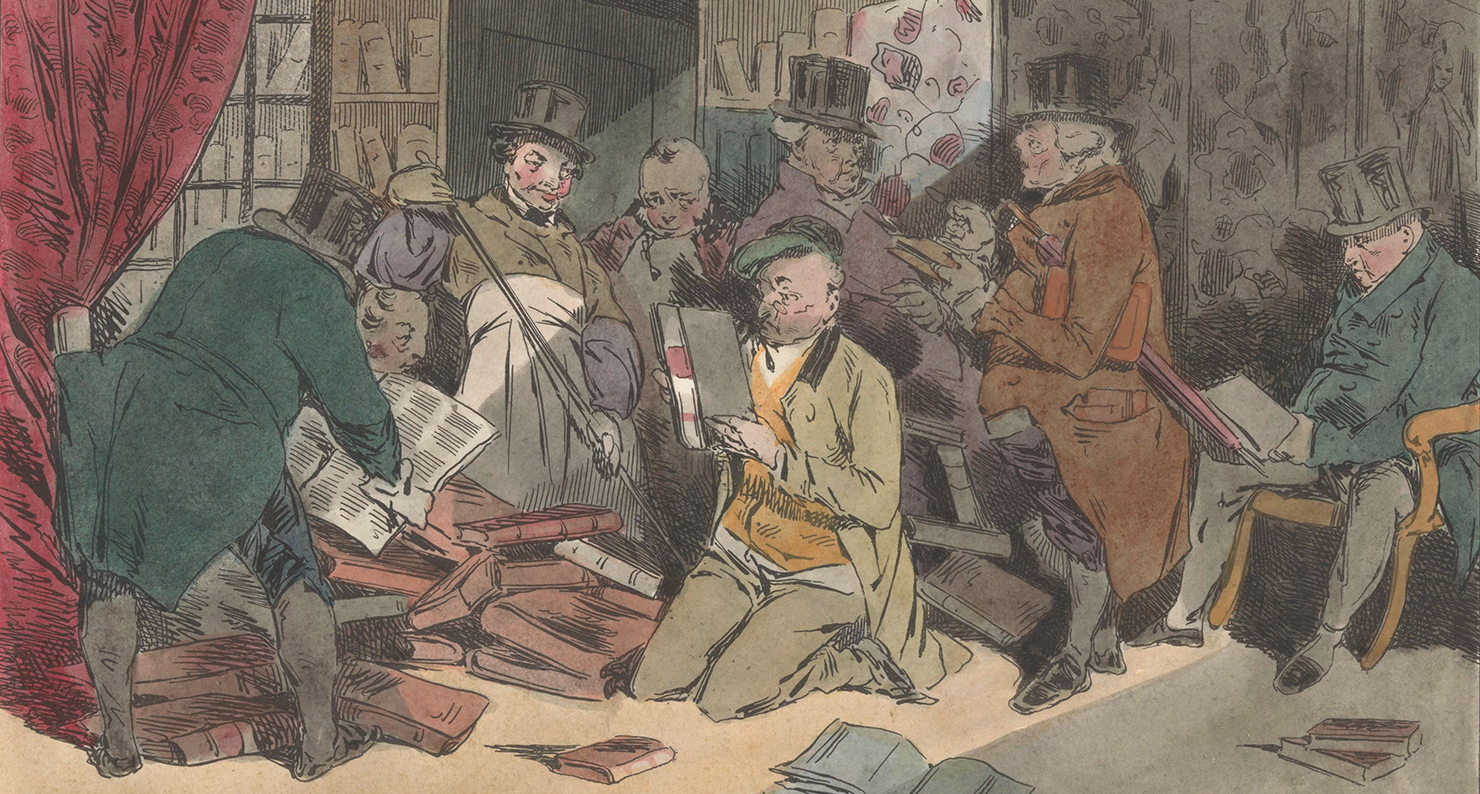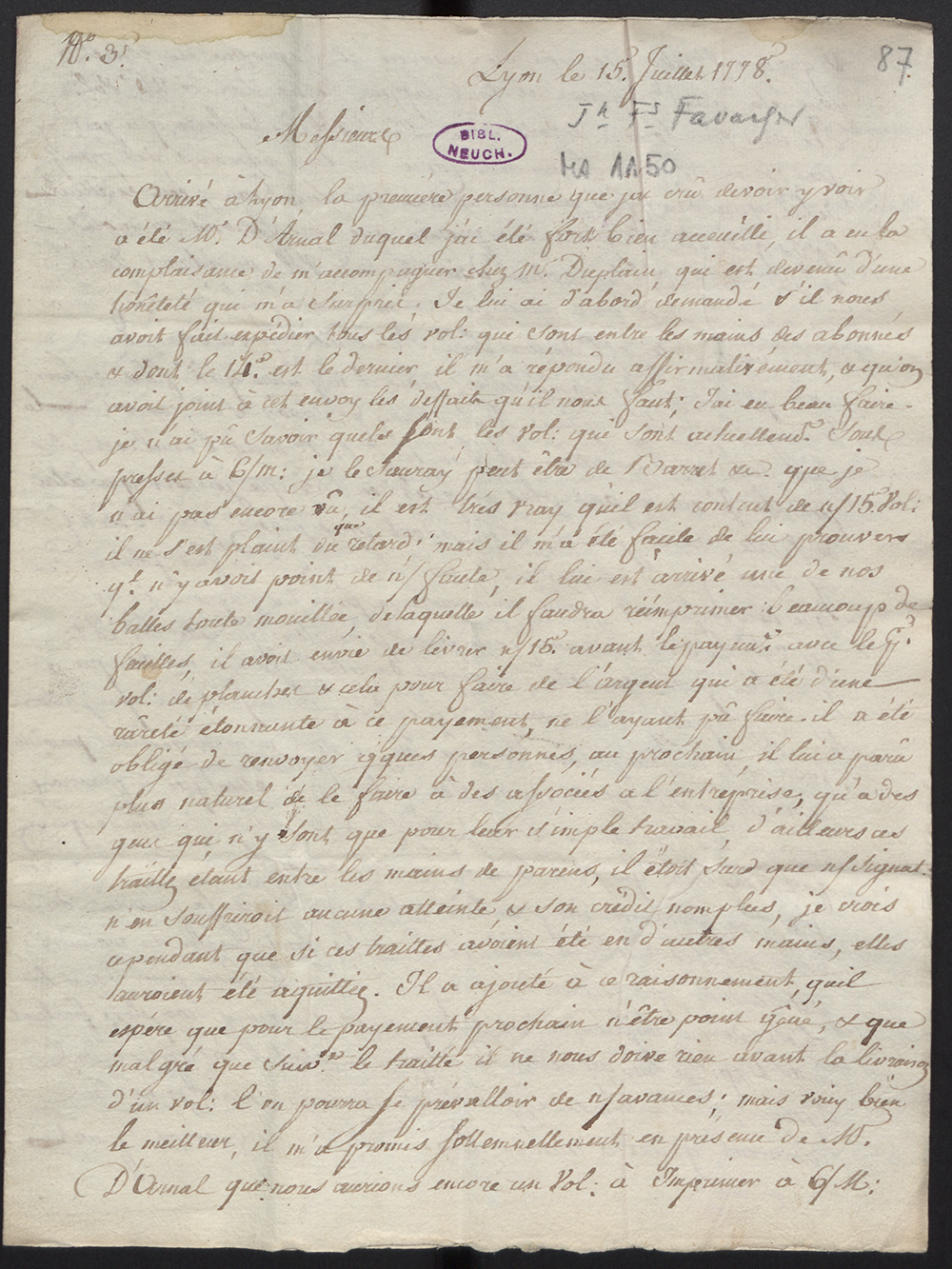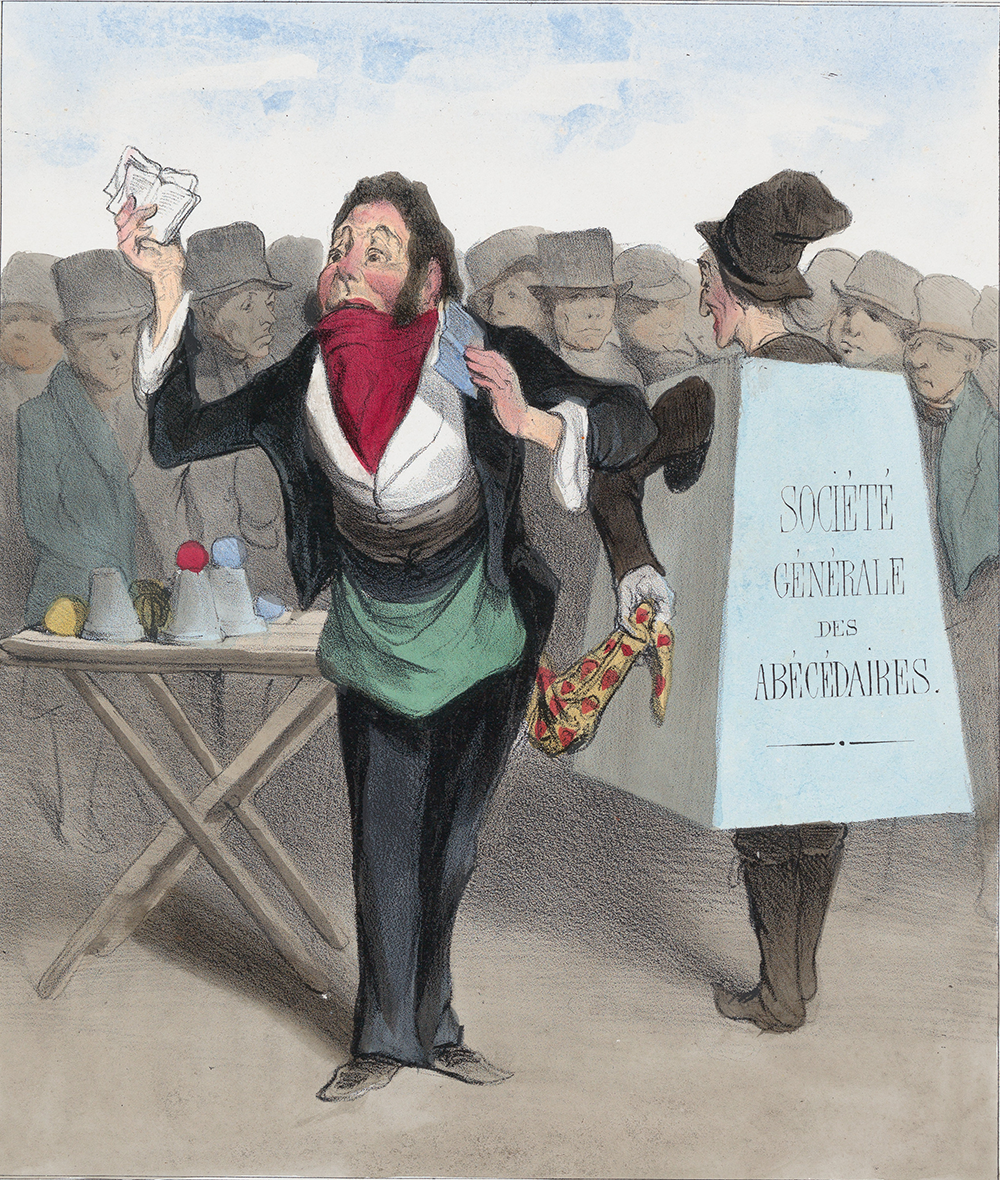
Book Dealers Inspect a Library, by Henri Bonaventure Monnier, 1829. Rijksmuseum.
One way to get to know a sales rep is to study his expense account. Jean-François Favarger’s expenses, calculated carefully in the French currency of livres, sous, and deniers, appear at the end of his diary. They provide a preview of his journey.
Before setting out on his horse, he had his coat repaired: 1 livre, 3 sous disbursed in La Neuveville, his hometown, ten miles north of Neuchâtel, on July 3, 1778, two days before he took to the road. The garment probably was a redingote (riding coat), a solid piece of cloth waxed to withstand rain, not at all comparable to the finery that gentlemen wore, with fancy trimming and double rows of well-wrought buttons. Favarger needed protection from the elements. They were kind to him on the first leg of the journey. But in August, when he reached the lower valley of the Rhône, the sun beat down on him relentlessly and the redingote probably was tied across his saddlebags. Favarger encountered very little water, even in riverbeds, until September 6, when he entered Carcassonne. Then it began to pour. From Toulouse to La Rochelle, it hardly stopped. Favarger had to buy a new hat: 10 livres. And he had put up with so much friction in the saddle that he also had to purchase a new pair of breeches: 26 livres, both for the breeches and for a quilt to get him through the chilly nights that set in at the beginning of October. The roads were then so muddy that his horse slipped and fell several times a day. He took to leading it by the bridle and walked so far under such bad conditions that he wore through his boots: 3 livres, 3 sous for resoling. Sweating under the summer sun in Languedoc and shivering through the autumn muck in Poitou, Favarger did not cut much of a figure on the road. He probably smelled when he arrived at country inns. Only twice on the entire circuit did he enter expenses for laundry: 1 livre, 10 sous in Toulouse and 1 livre, 4 sous in Tonneins—the rough equivalent each time of a day’s wages for one of the Société typographique de Neuchâtel’s printers. He carried a hunting knife and a brace of pistols, which he had worked over by a gunsmith in Marseilles—10 sous—after being warned about highwaymen on the road to Toulon.
Not that Favarger looked like a highwayman himself, despite the dirt and dust that accumulated on his redingote. He had to be presentable when he walked into a well-appointed bookshop on the high street of a city. After his arrival in Lyon, he bought himself a suit with a waistcoat: 23 livres, 4 sous, 6 deniers for fabric (“voile” or light cotton) and tailoring. That was an important sum for a clerk—5 percent of his annual wages—but not an extravagance. Further along his route he treated himself twice to ribbons (12 sous each) for binding the tress of hair that he wore down the back of his neck. He was not the sort to wear a wig or carry a sword. Like many journeymen, however, he had a watch: repaired in September for 2 livres, 8 sous. And when in company, he exchanged his boots for shoes: he purchased a new pair for 4 livres, 10 sous in Toulouse. Favarger’s expense account provides a rare opportunity to picture someone from the lower strata of society two centuries ago. Yet the picture quickly blurs. We do not know the color of his eyes.
It is possible, however, to form some notion of the young man’s character. The style of his letters is straightforward and unadorned, the grammar and penmanship excellent, as befitted a clerk. Favarger must have had a good basic education, though he did not attempt the rhetorical flourishes and literary allusions that sometimes decorated the letters of his superiors, the directors of the Société typographique, who were accomplished men of letters. His was a business correspondence, so one should not read too much into it. But insofar as it expressed a turn of mind, it suggests someone serious, eager to please, hard-working, and rather self-effacing. Favarger took the world in at street level, eyeing it squarely and describing it in no-nonsense language: subject, verb, predicate. On rare occasions he showed a touch of humor. He characterized the book inspector of Marseilles as “one of those men who would eat his brother in order to have a meal,” and Buchet, a bookseller in Nîmes, as “something of a camera obscura.” But he did not go in for figurative language and rarely used the colloquialisms peculiar to the book trade—expressions such as the compliment that he paid to Malherbe, an illegal book dealer in Loudun: “He is very good at selling his shells” (“Il sait fort bien vendre ses coquilles”).

Favarger may have been modest but he was no pushover. He negotiated hard with booksellers and did not hesitate to take debtors to court. When Cazaméa, a dealer in Toulouse (the documents often do not give first names), tried to bully him into reducing the fixed prices of his company’s books and then, in a fit of temper, tore up an order, Favarger stood his ground. He was not impressed with Faulcon, syndic of the bookseller’s guild in Poitiers, who strode about town “puffed up with his office.” Nor did he appreciate the pretentious manner of the patricians in Lyon, who claimed that they could not spare time to negotiate with him and in fact spent more of the day dining than tending their shops. Booksellers farther south, like Chambeau in Avignon and Phéline in Uzès, belonged to a different breed: all talk and no business. The lazy and loquacious did not receive high marks in Favarger’s reports to the home office. When he encountered palaver, intrigue, and dolce far niente, especially among clients in the Midi, he wrote as if he had come up against a foreign civilization—and indeed he had: he was a good Swiss in a world of inscrutable French.
Despite its commercial character, Favarger’s correspondence provides hints about the way he saw that world. It was not entirely businesslike in tone, because he knew his employers well and could confide in them. They were, to be sure, his social superiors—wealthy and learned gentlemen, who commanded a great deal of respect in the small world of Neuchâtel; so he always wrote in a deferential manner. Yet they had invested confidence in him, having hired him as a youth and trained him in their shop. They entrusted him with some delicate negotiations and expected him to send confidential reports on every bookseller that he encountered. His running commentary on the human element in the trade therefore suggests something about his own views as well as the tradesmen themselves. He expressed most sympathy for booksellers in small towns, who bargained in a forthright manner, accepted reasonable terms, took few risks, paid their bills on time, and enjoyed a solid reputation among their neighbors. For example, Pierre le Portier in Castres received a favorable report: “He seems to do a good business, because his shop is well assorted. He has the look of a decent fellow, and promised me he would soon send an order to the home office.” Having taken soundings with local merchants, Favarger rated le Portier’s credit as “very good”: “You can entrust shipments to him in full confidence. People spoke very favorably of him to me. He is fairly well off, despite the obstacles put in the way of booksellers in small towns who sell pirated works.”
Not many booksellers received such high marks, for Favarger had spent enough time sniffing around shops on earlier trips to cure himself of any naïveté about the morals of businessmen. He often encountered rogues and cheats, like Buchet of Nîmes, who was secretly squandering his wife’s dowry, and Caldesaigues of Marseilles, who tried to cut a surreptitious deal on his debts after declaring bankruptcy. Although he deplored such behavior, Favarger understood the necessity of dealing with imperfect human beings, especially in the vast illegal sector of the trade. His remarks about booksellers sound realistic but not cynical, critical but not prudish. On rare occasions, he gave vent to indignation. For example, when Vernarel, a bookseller in Bourg-en-Bresse, ordered a shipment of a new book from its publisher in Paris and then sent a copy to the Société for pirating, he exclaimed, “What a character! Didn’t he think he would compromise his conscience by sending us the book that I spoke about to you in my last letter?”
In general, however, Favarger reported on business practices, some of them dubious or illegal, without moralizing. He sold plenty of pornographic and irreligious works, treating them and everything off-color (“scabreux”) in a matter-of-fact manner as articles of trade. The booksellers responded in kind. Only once did Favarger come across a dealer who mixed ideology with business, and that encounter astonished him: “Arles. Gaudion is pure gold, but he is a curious character…When I spoke to him about the Bible and the Encyclopédie, he replied that he was too good a Catholic to try to spread two such impious works, that all the Encyclopédies had been offered to him, but that he would certainly not sell any.”
The Bible was impious in the eyes of this bookseller because it was a Protestant edition, full of heretical commentary. As a good Swiss Protestant himself, Favarger entered alien territory when he pushed down the Rhône Valley and deep into France’s Catholic heartland. Upon arriving in Marseilles, he was disappointed to find all the shops closed, as it was the day before the Assumption of the Virgin: “The cannon in the fort and the ships are booming out wonderfully now in honor of the Virgin Mary.” Strange sounds to Protestant ears. Favarger was shocked by the “bigotry” in Toulouse and repulsed by the intolerant attitude of the book inspector there and in Marseilles. Having heard rumors that Louis XVI was about to restore civic rights to Protestants—they had been denied all such rights, including the right to inherit property and be legally married, by the revocation of the Edict of Nantes in 1685—he expected a sympathetic reception in the inspection offices (chambres syndicales) of the provincial guilds. In fact, many guild officials promised to look the other way when shipments of Protestant books arrived from Neuchâtel. But Favarger felt he was being eyed suspiciously, as both a heretic and as an agent of a foreign publisher.

Those qualities complemented each other, because the underground channels for diffusing Protestant books in the sixteenth century had opened a way for the Enlightenment two hundred years later. From Pierre Bayle to Jean-Jacques Rousseau, philosophers with a Protestant upbringing had given a particular inflection to radical thought; and from Amsterdam to Geneva, Protestant publishers made use of the Huguenot diaspora in order to market the works of the philosophes along with Protestant books. Favarger was no intellectual, but he acted as an agent of Enlightenment simply by going about his business. His employers provided him with books to sell, and he sold the Bible along with the Encyclopédie, as if they were perfectly compatible. In the context of the eighteenth-century book trade, they were.
Although Favarger may have had his own ideas about philosophical questions, he never expressed them in his business dealings. Nothing in his letters or diary suggests that personal convictions influenced his activities as a book salesman. He simply was born a Protestant and took his Protestantism with him when he traveled. It was a way of being that probably came naturally to him—one that made him feel comfortable in the company of Protestants in France. He could relax among people of his own sort, people who worked hard, talked straight, and paid their bills on time. To be sure, they included a few reprobates, like the pastor Dumont in Tonneins, who sold off his shipment of Bibles and then refused to pay for it. But as a rule, Favarger relied on fellow Protestants as people who could be trusted in alien territory, where they still had no civil rights. French Huguenots relied on trust among themselves and had to do so in order to survive centuries of persecution.
Thanks to the long lines of kinship and friendship that bound the French and Swiss Protestants, Favarger could count on help in finding his way around France. He kept a list of Huguenot pastors in his diary, and received hospitality from Huguenots everywhere he went. They also gave him letters of recommendation to others of their religion so that he could draw on reserves of local knowledge and support when he tried to settle accounts and extract orders from Catholic booksellers. In Nîmes he went to hear the great Protestant leader Paul Rabaut preach “in the desert”—that is, outdoors and outside the city limits, because Huguenots were not allowed to worship publicly in churches of their own. Rabaut and his son, the future revolutionary Jean-Paul Rabaut Saint-Etienne, were friends of the Société’s principal director, Frédéric-Samuel Ostervald, and they provided Favarger with the addresses of still more Protestant pastors to contact along the rest of his route.
He also received a warm reception from Protestant laymen who had studied in Neuchâtel, often in the boarding school where Ostervald himself gave lessons in arithmetic and geography during the 1750s. Ostervald should not be confused with the humble variety of village schoolmaster, however. He was a wealthy patrician, deeply involved in local politics, but he seems to have been an inspiring teacher as well as statesman. One of his most devoted former students, a merchant named Jean Ranson, provided hospitality for Favarger in La Rochelle and described their time together in a letter. Favarger, he wrote, “has a frankness that is rare among the French and commonplace in your country. I asked him if he had not studied in the collège [secondary school] of Neuchâtel. No, Monsieur, he replied. It was at the one in La Favarge, where M. Ostervald took me away from the field I was plowing by asking me to be his clerk, and I became his clerk.” Taking measure of Favarger’s social graces, Ranson asked him whether he played a musical instrument. “Ah, Monsieur, he said to me. Don’t expect to find that I have a talent for anything. I have absolutely none at all.” Ranson had not encountered such modesty in the upper ranks of the provincial bourgeoisie, and he was impressed. “There is nothing like good faith of that kind to win my affection.” This is the only description of Favarger that exists in the papers of the Société, but it confirms the impression of a self-effacing but self-reliant young man that is conveyed by his letters.
From A Literary Tour de France: The World of Books on the Eve of the French Revolution. Copyright © 2018 by Robert Darnton and published by Oxford University Press. All rights reserved.